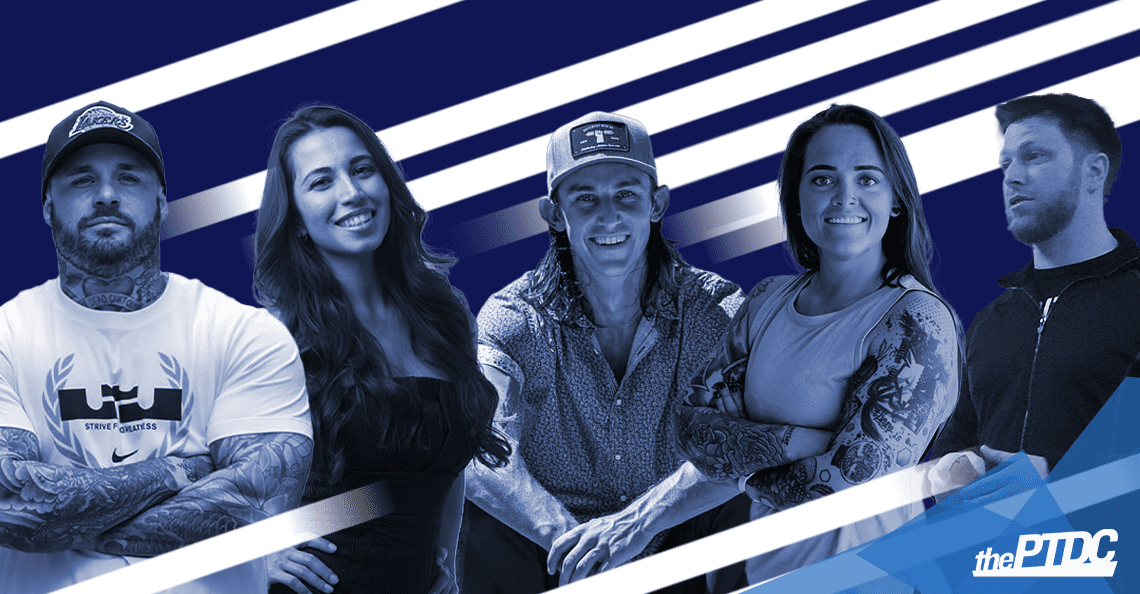Mental health struggles are common, but when you’re a fitness coach they present a unique challenge.
Depression can sap your energy, making it harder to coach and motivate clients.
Plus, you may feel pressure to project confidence and positivity—to “play the part.”
“A lot of people who are depressed feel they have to hide it or cover it up,” says psychologist Lisa Lewis, Ed.D. “People who feel they need to ‘walk the walk’ or ‘talk the talk’ might overcompensate even more.”
But acting gregarious and extroverted can be taxing if that’s not how you feel.
Does that mean you can’t be a successful coach? Not if these five fitness professionals have anything to say about it …
Five successful fit pros who struggle with mental health tell you how they do it
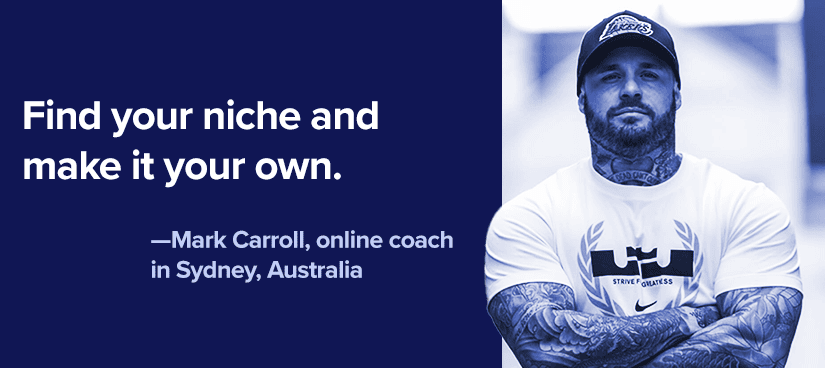
I started having issues when I was 16. It’s been a journey of diagnoses: depression, bipolar II disorder, borderline personality disorder … That’s the thing about mental health: It’s not always easy fitting into one box.
When you’re a trainer, people hire you to be their rock. They’re looking to you to be that stable, happy person and help them with their dark place.
That’s hard when you’re not feeling great, especially when you train clients face-to-face, which I did for 13 years.
Now I train just online, so I can hide it more.
To be honest, I never questioned whether I could be successful in fitness. I didn’t have a choice. I didn’t know what else I would do.
It was just a matter of finding my place. Where do I belong? Where can I thrive?
For me, I love epic transformations and elite-level training. That’s who my business attracts—bikini girls and guys who want a lot of muscle.
I’m pretty good at it, too. But I’m not for everyone. That doesn’t make me a bad trainer—just the wrong trainer for certain people.
My point is: There are so many opportunities to be who you are. You just have to find that right client.
That’s why social media is such a fantastic tool. You don’t need to walk the gym floor being smiley and extroverted. You can be yourself.
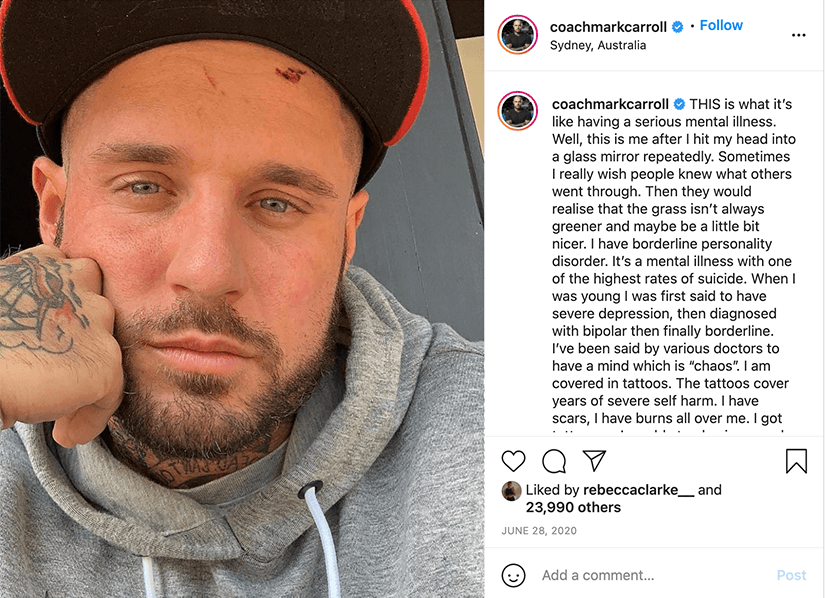
I see messages every day from introverted trainers hating the gym floor life. It’s not because you’re not a good coach. It’s because you’re in the wrong environment.
On social media, your personality attracts like-minded people. If you’re kind and thoughtful, you’ll attract that audience.
You create an environment for who you want to attract.
(Promote personal training on Instagram without getting half-naked.)
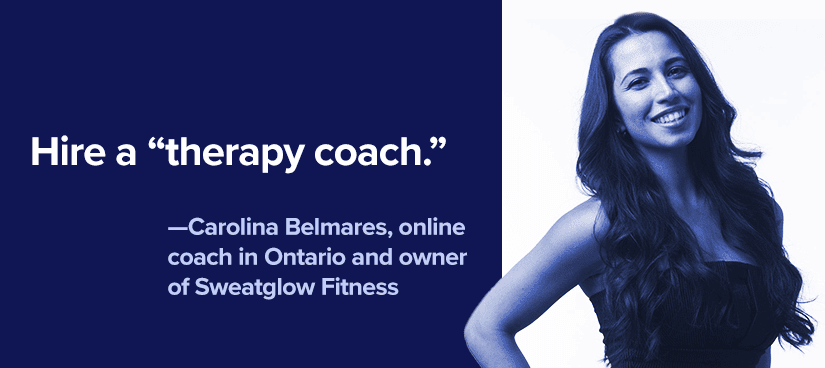
I’ve struggled with anxiety attacks and bouts of deep depression. At times I’ve thought about hurting myself. Recently I’ve realized I may have undiagnosed ADHD.
The ebbs and flows of my mental state can make it difficult to plan and execute. It’s difficult to plan a launch only to be thrown into depression right in the middle of it.
You feel paralyzed—literally like you can’t move and can barely breathe. Just the thought of existing is unbearable.
When you have a job that relies on your energy and enthusiasm, that’s scary.
We’ve been brought up to believe that success looks like planning, focusing, hustling. Well, that’s one disheartening message for someone like me!
If on any given day I can wake up unable to function … if I can forget important deadlines … if my heart can race and my breathing quicken, and the paralysis of anxiety take over … does this mean I’m not meant to be successful?
Of course not! You learn to counterbalance those times with the waves of hyperfocus, high energy, and productivity. You set up your work so those moments carry you.
It’s easy to fall into the “if only” trap:
If only I wasn’t like this. Imagine all the things I could do!
That thought is there humming in the background, but I also know that this same brain that trips me up is also responsible for the unique traits I love about myself.
For example, it makes me extremely impulsive, and this has done wonders for my career!
I’m able to pursue ideas quickly—I don’t have that brake that stops others from taking action. This has opened doors for me, helped me make more money, and taught me a lot. So thank you, brain!
My number-one strategy: I’m diligent with my therapy. I never miss an appointment. It matters too much. (I talk about it on this episode of the Online Trainer Show.)
I’m a coach, and I understand the value of coaching. That’s what therapy is: a form of coaching.
I have my business coach. I have my fitness coach. And I have my therapy coach.
Like any coaching relationship, you find one who fits and feels right for you.
As fitness professionals we carry the stigma:
If I was really healthy, I wouldn’t feel this way. Maybe I need to exercise more or eat better.
It’s not like that. You can do everything right, and still a switch flips in your brain.
And you can do therapy proactively, by the way. Imagine if our clients came to us before putting on 75 pounds. The world would be different!
Therapy is the deep, hard work that makes a difference. Think of a client who jumps on the latest fad diet versus someone who takes the time to understand their difficult relationship with food. It’s night and day!
That’s what therapy is: It’s pulling up your sleeves and stepping into the muddy, complicated stuff. And it pays off.
A million times over, it pays off.
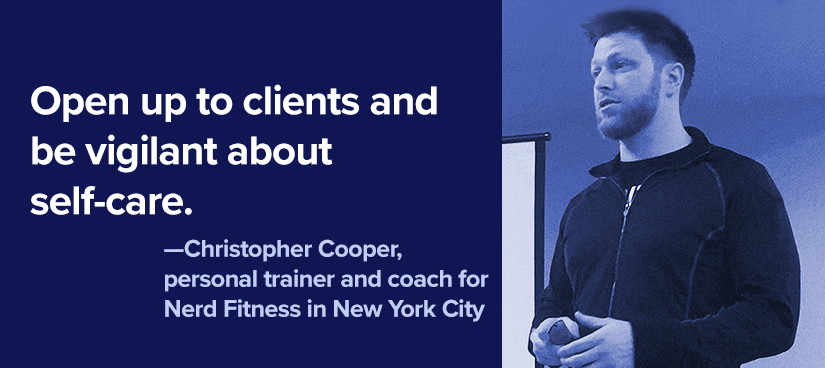
My mental health struggles circle around anxiety and depression, plus a dose of impostor syndrome.
For the longest time, I just ignored it. I’d show up for work and try to play the part. Some days I did a better job of it than others.
I used to absorb my clients’ emotional energy like a sponge. When they struggled, I took that on and it drained me.
But I never revealed these struggles for fear of how clients, coworkers, and peers would perceive me.
I thought I was supposed to have it all together, and if I didn’t it made me less of a coach. How could I help clients if I couldn’t help myself?
Things only got worse when I opened my gym. The stress and pressure were a lot to handle, and I had zero strategies in place to manage it.
But here’s the thing: When I started opening up about my struggles, I found my coaching actually became better.
I was able to connect with clients in a way I hadn’t before. They saw me as a human, not a trainer who does everything right.
Now I practice one form of self-care each day to recharge my batteries (in addition to regular exercise and a 5- to 10-minute daily check-in with a therapy app called Bloom).
That self-care might be journaling, doing crossword or sudoku puzzles, drawing, or building with Legos—anything creative that can shut off the analytical side of my brain that I use all day.
On some level, I still worry that others will use my mental health struggles against me. And I still have days when I feel drained.
But by staying vigilant with self-care, I’m able to bounce back. By focusing on my needs, I can do a better job helping people with theirs.
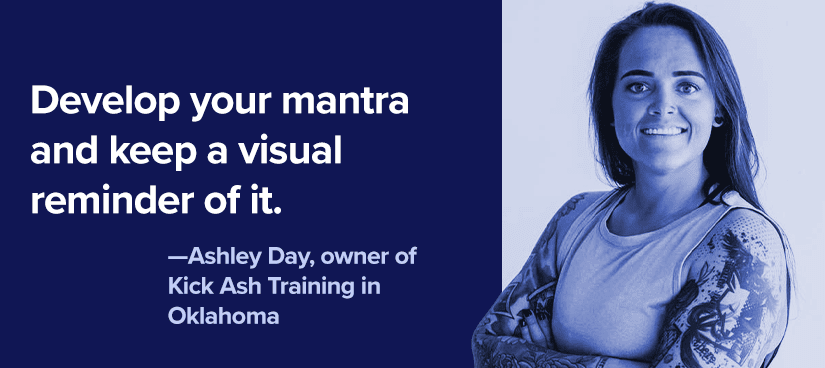
Life is too hard already for us to be treating ourselves like our own worst enemy.
Time spent in the gym (and outside of it) should be about building yourself up, not tearing yourself down or punishing yourself for not being thin/big/fast/strong enough.
That’s my whole thing.
“Kick Ash Training” might sound big and bad. But it’s really just a business with a smart-ass name run by a lesbian dog-mom in Oklahoma who wants everyone who comes to her to be happy, healthy, seen, and heard.
I’ve been diagnosed with all sorts of acronyms and disorders. I’m a very anxious person and the poster child for adult ADHD. Toss some seasonal and situational depression into the mix, and it can be an all-around real good time.
I used to worry that my abilities would hold me back in this industry. (Being your own boss is rough when you have ADHD.)
There’s a misconception you must be the stereotypical “Instagram model” coach with the perfect body and the perfect pitch, and that can be intimidating.
I wondered if I was too “broken” to lead people. It took me a long time to realize that “brokenness” is exactly the thing that appeals to my clients.
In the words of Brené Brown, “Vulnerability begets vulnerability.”
By opening the door to my own struggles, I made it okay for clients, prospective clients, and even total strangers to reach out and be honest about their own.
I’m a sucker for mantras, and I’m constantly hitting my clients with all these little sayings, like:
- “You’re not trying. You are doing.” (Shout-out to my therapist for that one!)
- “If it’s good enough for you, it’s good enough for me.” (Meaning: Always give yourself the same grace you’d give your best friend or partner.)
- “No zero days.” (You don’t have to do everything in a day—just make one step, even a small one, toward your goal.)
I’ve been known to make little gifts for my clients like silicone wristbands or a keychain trinket—anything to serve as a visual reminder for them to grasp onto when they need it.
Personally? I have two full sleeves of tattoos with deep meaning to me.
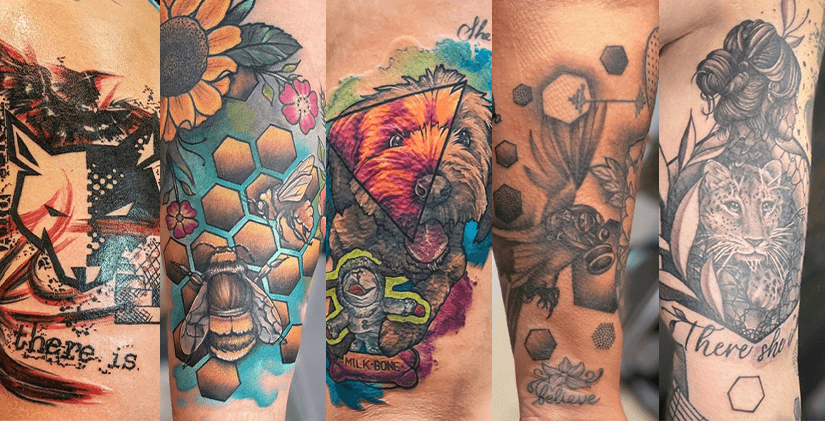
Among Ashley Day's tattoos are her logo, bumblebees (which fly despite inefficient aerodynamics), a memorial tattoo of her labradoodle, and a cheetah (inspired by a story from Glennon Doyle’s memoir Untamed).
My left arm is a black-and-gray sleeve with a pop of red—it incorporates my business logo plus a bunch of smaller pieces inspired by Glennon Doyle essays, and a cool geometric and floral design.
My right arm is full color with bumblebees and flowers. The bees have significance.
I read once that, with how big their bodies are and how tiny their wings, bumblebees shouldn’t be able to fly. But here they are, defying physics.
It reminds me to make my own rules—in my life and my business.
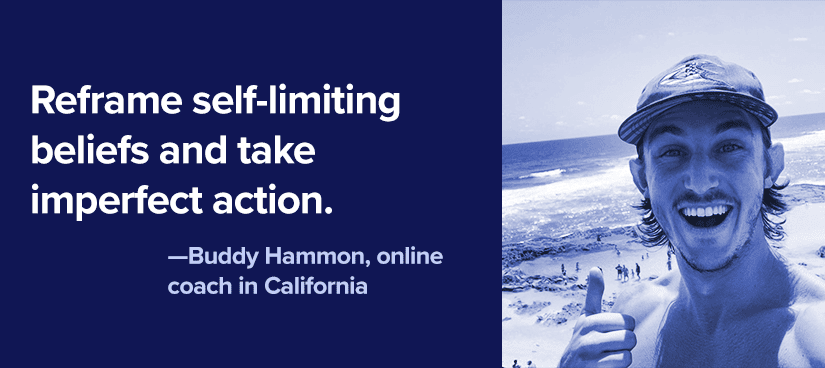
My earliest memories are of my dad being late from work.
He’d say he’d be home at 5:30, and at 5:37 I would start to freak out and imagine the worst-case scenario. What if he was in a car accident?
Of course, he wasn’t. He was just running late. But it was this anxiety of “Things aren’t the way they’re supposed to be.”
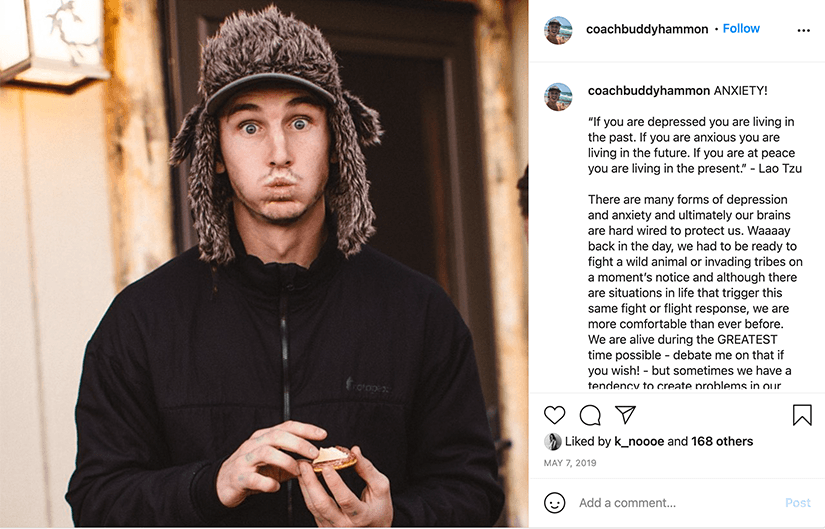
I was never diagnosed, but growing up I struggled with anxiety and traits of obsessive-compulsive disorder and ADHD.
As I got older, that anxiety shifted from my parents to my income.
As trainers, we can’t always count on a steady paycheck. We live through highs and lows.
There’s the fear of “Is this sustainable enough?” All those thoughts and fears can get heavy and create a lot of noise in your head.
When I was coaching at a gym and class sizes started to shrink (meaning I was earning less for the same amount of work), my anxiety hit the hardest.
Plus, while I loved the gym at first—loud music, big smiles, high-fives—I started to feel like I wanted to do more for people. Instead of just watching people’s form or cuing them for running intervals, I wanted to provide a more in-depth, holistic experience.
So I left and started my own business. I traded in the security of being employed at a gym for the freedom to charge what I wanted and serve people the way I wanted to.
But launching your own business comes with a ton of anxiety. How do I do this? How do I justify charging this much?
Sometimes you get a huge win: “Wow, I signed 10 people at $300 for a two-month program! This is easy!” And before you know it, you’re in week seven like, “How do I get clients to renew?”
It’s this constant battle.
For me, the solution was two-part:
1. Identify and deal with your self-limiting beliefs.
I used to think: There’s not enough people out there who can afford my service or who are willing to work with me.
If that’s what you believe, you won’t feel motivated. You probably won’t post on social or put yourself out there, and as a result your business won’t grow.
On the other hand, if you focus on different beliefs—I have the ability to provide value for people; there are people out there who need my help—that’s going to motivate you.
2. Take imperfect action
One thing that really helped me was joining the Founding Client Challenge—the Online Trainer Academy’s seven-day challenge that has you put yourself out there and get clients in just seven days.
The point of the challenge is to get out of your comfort zone and start building your online business, even (especially) if you don’t feel ready.
Seeing the results I got from the challenge helped give me the confidence to charge more.
The thing I've learned is that when I charge more for my service, clients are actually more invested in the journey, they put in more effort, and in turn experience better results.
We know that working out and eating better will help people feel better and be healthier. That’s not a guess. It’s a scientific fact.
I love helping clients understand that when you take care of yourself, you're better able to take care of others.
And that's what life is all about.

